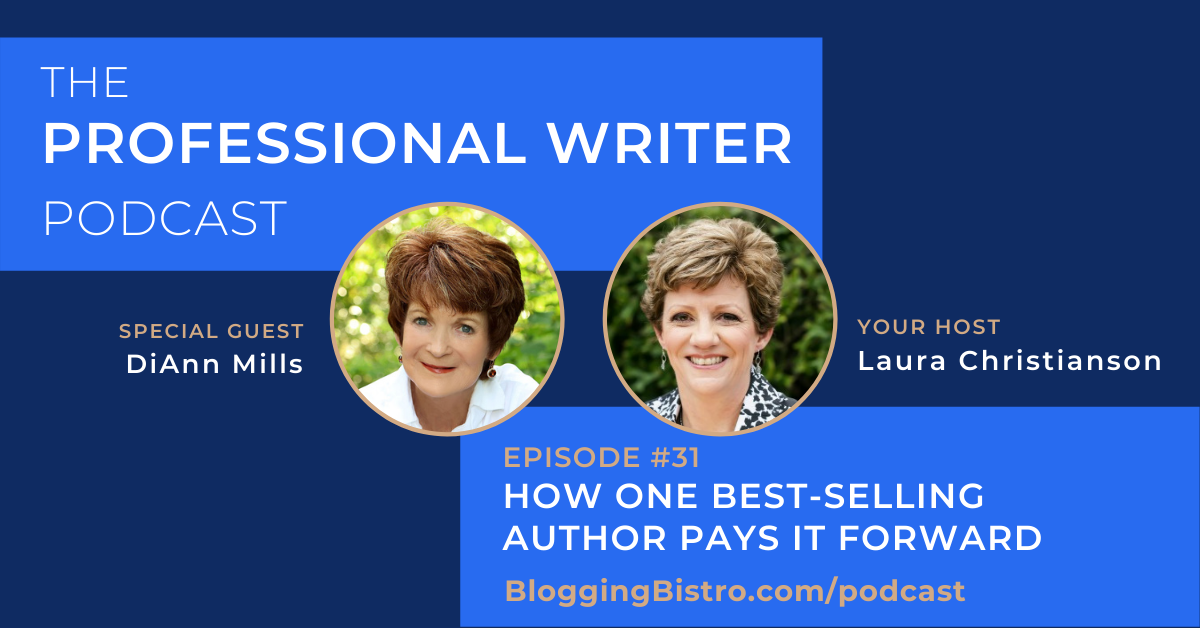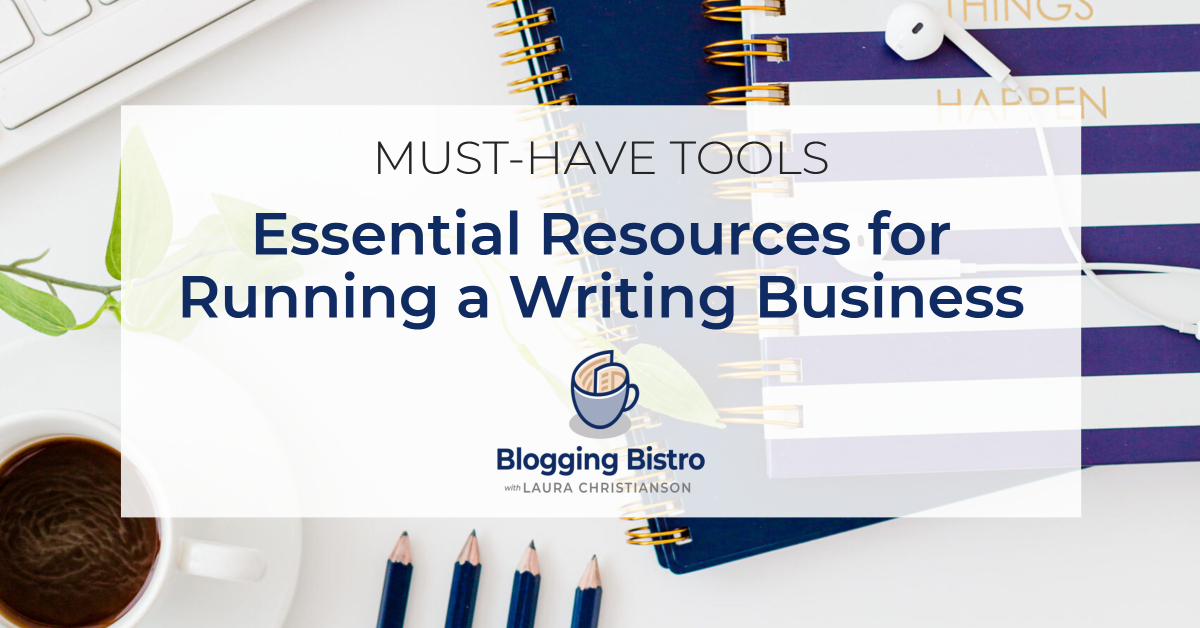31 – How One Best-Selling Author Pays It Forward (with DiAnn Mills)
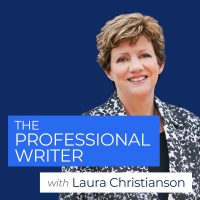
“When I was called into writing, I knew that whatever I learned, I was to share with serious writers – people who are committed, motivated, and ready to do the work.”
That’s exactly what DiAnn Mills does, through coaching, teaching, and directing retreats and conferences for writers.
Last week, in Episode #30, DiAnn shared the secret to writing believable suspense. She’s back with us this week to talk about:
- The tools writers must put in place to be successful.
- How to write for our “snippet society.”
- How parents can instill a love of writing in their children. DiAnn says, “The next generation of writers is crucial, whether they are 8 years old, or 28 or 38. They have to carry the torch. In order to carry the torch, they have to have the fire…that spark to make sure that happens.”
- How writers can give our best to the next generation of writers. “I want to make sure my writers receive the very best I can possibly give, whether it be coaching, a workshop, a continuing class, a big online experience, or whether I’m directing a conference.”
Full transcript at the bottom of the page.
Resources mentioned
Blue Ridge Mountains Christian Writers Conference
Airborne – DiAnn’s suspense novel that released September 8, 2020
About DiAnn Mills
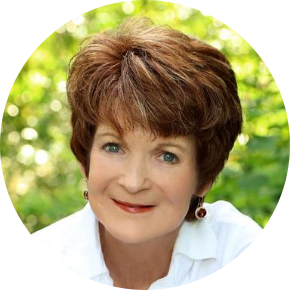 DiAnn is a bestselling author who believes her readers should expect an adventure. She weaves memorable characters with unpredictable plots to create action-packed, suspense-filled novels. DiAnn believes every breath of life is someone’s story, so why not capture those moments and create a thrilling adventure?
DiAnn is a bestselling author who believes her readers should expect an adventure. She weaves memorable characters with unpredictable plots to create action-packed, suspense-filled novels. DiAnn believes every breath of life is someone’s story, so why not capture those moments and create a thrilling adventure?
Her titles have appeared on the CBA and ECPA bestseller lists; won two Christy Awards; and been finalists for the RITA, Daphne Du Maurier, Inspirational Readers’ Choice, and Carol award contests. Fatal Strike won the 2020 Golden Scroll novel of the year.
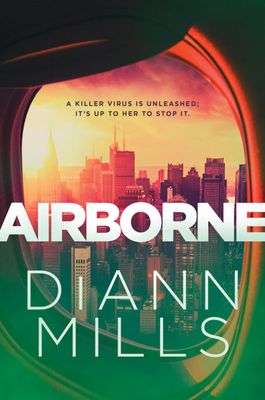 Her romantic suspense novel, Airborne, released September 8, 2020.
Her romantic suspense novel, Airborne, released September 8, 2020.
DiAnn is a founding board member of the American Christian Fiction Writers, a member of Advanced Writers and Speakers Association, Mystery Writers of America, Sisters in Crime, and International Thriller Writers.
She is the director of the Blue Ridge Mountains Christian Writers Conference and Mountainside Retreats: Marketing, Nonfiction, Novelists, and Speakers with social media specialist Edie Melson. DiAnn continues her passion of helping other writers be successful. She speaks to various groups and teaches writing workshops around the country.
DiAnn has been termed a coffee snob and roasts her own coffee beans. She’s an avid reader, loves to cook, and believes her grandchildren are the smartest kids in the universe. She and her husband live in Houston, Texas. Visit DiAnn at DiAnnMills.com.
How to Keep Up With the Show
Click here to join my my email list and I’ll notify you about every episode. (When you subscribe, you’ll also get my free guide, Essential Resources for Running a Writing Business.)
Join The Professional Writer Podcast Community (private Facebook group), where we discuss what we’re learning, meet our guests, and encourage one another on our writing journeys.
If you know a writer who would be interested in The Professional Writer Podcast, please share this link with them:
https://bloggingbistro.com/podcast
Thank you!
Laura
Read the Transcript
How One Best-Selling Author Pays It Forward (with DiAnn Mills)Laura: I’m delighted to welcome DiAnn Mills back with us for the second week.
DiAnn: Thrilled to see you again
Laura: DiAnn and I started a conversation last week. We talked about her new novel, Airborne, and about writing in general and about researching suspense novel.
One of the reasons why I decided to keep going with this conversation for the second week is because I have been experimenting over the last 7ish months this podcast has been on the air with all sorts of different lengths of episodes and with doing monologue episodes versus episodes where I have guests on and just kind of testing the waters.
This is what we all do when we’re starting a new business or when we’re starting a new venture that is related to our existing businesses. We test, test, test and then we keep doing what works and throw out what doesn’t. I have discovered that when I bring a guest on, my listeners have told me that they are enjoying 20 to 30 minute long episodes. As DiAnn and I were talking last week, I noticed that it was getting up to about the 30-minute mark and we were just having so much fun and it’s like let’s keep going.
When we turned off the recorder last week you said, “That’s why I like writing short chapters.” I’ve noticed that in Airborne, the chapters are usually only 2-5 pages long.
DiAnn: We live in what I call a “snippet society.” Everything is fast-paced and so it’s highly unlikely a reader will sit down and say, “Oh I have 2 hours to read on this book of mine and I’m really thrilled about that.”
That’s not happening. Let’s say we have a woman who’s waiting in line to pick her kids up from school and I have 10-12 minutes here. If I can read something, that’d be great. The idea of reading something quickly as in a short chapter… it’s that satisfaction. “Wow, I really like her! I can get through a chapter and find out something exciting (no pressure for us writers) and then you know my next free time I can do the same thing again. That works in the grocery store line. That works at the post office. That works in doctor’s and dentist’s office. Casserole’s baking in the oven. You’ve got a few minutes and so you can read. That’s when we want to reach out and grab something entertaining.
One of my quirks is that I’m a really big exercise fan. When I’m lifting weights it usually takes about 30-35 minutes. I know I can listen to a fabulous podcast of yours while I’m working out.
Laura: That’s so fun DiAnn; thanks for sharing that. I want to hear from others of you who are listening in right now too. Join the Facebook group and tell us what you are doing while you’re listening to The Professional Writer podcast. I sometimes will listen to it myself while I am going for a walk or while I’m riding my bike.
Today we are going to talk more about another aspect of DiAnn’s business, which is coaching writing and teaching writing. A little bit more about DiAnn that I didn’t share with you last week is that her books have appeared on many bestseller lists as CBA and the ECPA bestseller lists. She has won lots of different awards and been a finalist for many other awards and contests. She is also a founding board member of the American Christian Fiction Writers ACFW; she’s a member of Sisters in Crime and International Thriller Writers.
You’re involved in several different organizations which is also really important for serious writers that we get involved in different associations and organizations that can not only help us promote our writing but just put us around other like-minded people and we can learn with and from one another.
Not only that, but DiAnn is also the director of the Blue Ridge Mountains Christian writers conference and the Mountainside Retreats for marketing non-fiction, novelists and speakers. You’ve got a few things on your plate DiAnn.
DiAnn: That is a very good thing. I know when I was called into writing that it would be a balanced situation, that whatever I learned I was to share with a serious writer. And I’ve always said serious because we both know a lot of people who want to write a book but they’re not really ready to do the work.
With that I’ve always received the blessings of watching someone else go up another rung on the ladder as they get higher to their publishing goals and dreams and also the blessings of being published so both of those parts of the publishing world give me a tremendous amount of satisfaction. It keeps me on my toes. I can’t teach coach, mentor or direct if I am not on top of my game and knowing what’s going on in the publishing world… it’s a big Pay It Forward about sharing what you’ve learned with serious writers; people who are committed motivated willing to put in the work over the long haul.
Laura: A couple weeks ago I asked people, what is one of the most challenging aspects of starting and growing running a writing related business?
One of the people responded kind of jokingly but kind of not, writing. The most challenging part of owning a writing-related business is the writing.
DiAnn: A good friend and a writer hero of mine, Jerry Jenkins, kiddingly says we love being called writers. It’s the process of doing the writing so we often don’t like.
It’s a lonely profession; it’s just you and the computer and for many of us it’s me, the computer, and God. Sometimes I think he’s laughing at me and other times I know he is. But, we have to be disciplined and organized and scheduled. Many times, we need an accountability partner. We need the tools in place so that we can be successful.
Laura: You do some writing coaching DiAnn, correct?
DiAnn: Yes.
Laura: Do you work with parents of young children who have a dream to become a published writer? I know that’s a very challenging time of life to carve out meaningful time to do the writing. Seems like there’s always interruptions. I remember when I had young kids, even going into the bathroom to try to take a shower was challenging.
DiAnn: I have offered some advice to parents that has worked well. The biggest advice I can give parents is to encourage the writing on the side and for the young person to receive everything they possibly can from their schooling. Now, this is not a rabbit trail. This is just a little something but it goes along with that same statement. My granddaughter, who will be 14 here very quickly… when she was 8 and 1/2 I said to her, “What would you like for me to write you?”
She said, “I don’t want you to write me anything I want us to write something together.”
Okay, so I asked her what the book would be about and things of this nature and it was typical 8 and 1/2 year old dragon, a little girl you know hero that type of thing but when she said to me,
“Her name is Arrow and she will spell it a-r-r-o-a-h,” I thought maybe we might have something here.
I love my grandkids to pieces but I can be firm – rarely — but in this case I was I said, “Okay, we can do this but we’re going to do it together.” I said, “We’ll do this but I’m going to teach you how to write no matter how long it takes.”
It took two and a half years but she learned to write fiction. When she could say to me, “Oh, there’s a question mark at the end of that dialogue; that means I don’t need to say, he asked. You told me said was a blind word.”
And then you know the book came out but it was a memory maker. It was the biggest, sweetest memory maker that you could ever imagine. Nothing can ever replace that. If you have a child who is interested, go for it, but don’t do it for them. Teach them.
Laura: I didn’t do that with my kids because neither of them are writers. However, I did read to them all the way up to the point where they graduated from high school and moved away. One of the things I did from when they were really little — and I still have this file — I wrote down all the funny things that they said. I have this huge file. I just call it Benny and Josh’s funny sayings. I have years’ worth of these little quips and anecdotes that they said. That just reminded me, DiAnn… that’s how my writing career actually got started! I took a couple of those funny things that they said and I sent those into parenting magazines and they published them and sent me $35.
DiAnn: Oh, and I’m thinking about a whole book, “funny things kids say.”
Laura: We did go off on a little bit of rabbit trail but that’s okay. You coach writing and you teach writing so let’s talk a little bit about that and about your passion for coaching and teaching serious writers. What are some of the things you most love to coach and teach on?
DiAnn: Well, obviously fiction. I love every aspect of fiction. I am a pantser but I am an organic writer. In other words, everything comes out of character. So when I say that I teach and show a writer how to have a three-dimensional character before they even begin before chapter one, line one, that is very, very important to me.
I’ve just finished a book for another publisher titled, The art of exploring character, that I did that very thing. And coaching… let’s say that you recommended a writer to talk to me about coaching. I would personalize that coaching — those sessions — according to their ability, to their goals, to where they see themselves, their strengths or challenges. It is unique to them and I find it that’s very important and different than teaching to a group because to a group, you’re doing overall. As much as you encourage questions, you don’t have that one-on-one like you have when you’re coaching someone. It could be that one-on-one person that their biggest issue their biggest problem could be self-confidence and so you just have to push this aside and say okay let’s work a little bit on this confidence.
That’s what makes it so very, very meaningful. For years I did Jerry Jenkins with the Christian Writers Guild… his Craftsman program. I may have had 12 in a group but it was one-on-one coaching. I would have grown man cry at the end of the year because they’re sharing their hearts. It is more than just learning how to write; it is learning how to live and to adjust to the changing publishing world and to understand that.
For me and for many of my writers, riding is a ministry. Because of that, I want to make sure that my writers receive the best I can possibly give, whether it be a coaching, whether it be a workshop, whether it be a continuing class, whether it be a big online experience, or whether I’m directing a conference in which Edie and I are very, very careful to make sure that we have not only the best agents and editors but they are outstanding teachers. That makes everything very selective.
I don’t know if I’ve told you more than what you were asking for but I just want to share a little bit of my heart that the next generation of writers is crucial no matter whether they’re eight years old or they are 28 or 38. They have to carry the torch and in order to carry the torch they have to have those tools that that have the fire. But I’ve got to have that spark to make sure that happens.
Laura: I really like what you said about making sure that whether you are teaching, coaching, one-on-one — whatever size the group is — or directing your conference, that your primary goal is to make sure that they’re receiving the very best that you can give.
I have listened to a lot of podcasts from what you would call, in a worldly sense, successful entrepreneurs, who are making millions or multi-millions of dollars off of their businesses. Some of these people I have followed for 5, 10, 15 years. Sometimes, in their current podcast episodes or blog post, they say, “Oh my goodness; I can’t believe I said what I said on my podcast five years ago! I thought I knew what I was talking about but I really didn’t and now here’s how I’ve changed and here’s what I’m offering now.”
Sometimes I have trouble with that but most of the time I’m thinking, “Okay; that shows me that at the time, 5 years ago, that person was still giving the very best that they were capable of doing at that time. During the ensuing five or ten years they have grown, they have matured, their businesses have matured. They’ve learned so many new things along the way but they’re still out there giving the very best that they are capable of doing in that moment.
I wanted show some grace to our listeners because you know you may go back and look at something you wrote five years ago and just go, “Oh my gosh; that was horrible! I can’t believe I wrote that!”
DiAnn: I do that.
Laura: Coaching and teaching are Income streams for you. I also coach people, on websites web-based writing. Some people have the attitude like I’ll just take you out for a cup of coffee at Starbucks and in an hour you can tell me everything I need to know about how to write a novel or how to build a website and it will be good.
Talk a little bit about that mindset. Do you ever meet with people who want to just pick your brain because you have a lot of experience as a writer, as a coach and as a teacher?
DiAnn: Usually I can see through someone who is naive and doesn’t understand what all is involved and someone who simply wants all the information without working for it. Both of them lack the knowledge. One doesn’t know. “Oh my goodness. I would never have asked you that if I had any idea what that was all about.”
Or, “Be my best friend and then once I get my book published I don’t need you anymore.”
We don’t want that either I think that we need to be gracious. I think that we also need to understand that you would not go to a surgeon to do brain surgery who said, “I learned everything I know by having lunch with XYZ surgeon.”
We want the one who has done the work. While a writer may walk away and say, “You know if I have to pay for someone to teach me these things then it’s not worth it,” then they really didn’t want it and they would never work hard to begin with.
So, as I said, I would I design according to, “Okay this is my budget. This is all I have.” Sometimes it works and sometimes it doesn’t. I’m not going to cause them to take out a loan. Neither am I going to do it for free. I try to be reasonable because I feel that that a being a good steward.
There is no free lunch. There is no free lunch. While that can be sort of a harsh statement at times, it is very true. If you want something that’s free, then what you’re going to get from someone else is free. And while I might do that for a little, I draw the line because it is not good for them anymore than it is good for us.
Laura: What to charge as always a challenge. Do you base that on your years of experience in this industry, among other factors?
DiAnn: Yes, experience. What it will involve for me? How much homework I give you? What would be needed outside the sessions?
I usually take just one coaching student at a time because of all the other things I do. I just take one editing project at a time so I want to give you my best. If I don’t have an answer and I’ve got to run to my Chicago Manual of Style and pull up the section and make sure that you have that or find you other sources, then not only am I learning a little something there, too, but I need to be compensated for that. So number one, yes, they are paying for experience.
They are paying for having a hundred percent me. I am not baking cookies while we’re having our coaching session. No, I’m not going to be doing that — you have 100% of me and I think that’s valuable.
I know that when I was learning how to write and those who mentored me — the ones I value or the ones who didn’t do it for free — they gave it all. I never felt anything I ever received was unreasonable. Never.
Laura: What was your own progression toward becoming a writing coach and a writing instructor?
DiAnn: It was more of a winding path that came chronologically. I was writing and because I was writing, when I saw the value of a writing group that met in my home for 10 years where it was critiquing — it was not writing instruction — it was critiquing — the more I did the more I realized how much I enjoyed it. I came on board with Jerry Jenkins’ group so it was a winding road that came as part of what I thought was my calling. The more I learned, the more saw the need for other writers to be able to have the tools needed to write better. So it was a winding road.
Laura: I like what you just said about being aware of the need because I think that that is so true for all of us who are involved in any type of a writing-related business. We watch. We listen. We ask questions of our audience, and we discern what their key needs are, related to the skills and knowledge and expertise that we have to offer and the ways that we can help them.
We look for ways that we can serve them, whether we’re just starting out, but not with the intent of earning any money or perhaps doing it like DiAnn and I are doing it… as a way to earn income, support your family, or a little bit of each. We do a little bit of both because both you and I are very involved in writing-related organizations. You’re co-directing a writers conference and a writers retreat. Tell us about the conference and the retreat. Where we can go to find out more about them? I will put links to this in the show notes.
DiAnn: Wonderful wonderful! You can go to blueridgeconference.com. That’s the website and it not only has all the information about our Blue Ridge conference — we did postpone our May conference to November 15th through 19th and that’s coming up. And then we will have our regular yearly one in 2021 in May.
But we also have information about our retreats. We have a Mountainside Marketing Retreat and we never even touched on that but that’s what a writer needs for social media success, book launches, and things of that nature.
Nonfiction… we have a small retreat for nonfiction and we don’t have agents or editors at these retreats. It is just small and learning.
We have fiction… a novelist retreat. I love that one! And we have speaking and those are small venues in which you get one-on-one. The instructors will help you move up to that next level and it’s just a wonderful sampling. You know, it’s like going to an ice cream store and you say, “Oh, I want some of this and I want a scoop of that one,” and they’re all sweet and they all taste delicious. “Which one do I take?”
That’s how I feel about teaching and coaching and directing these conferences. I offer you the best ice cream ever.
Laura: Thank you so much DiAnn for dedicating so much of your life and your career to helping other writers move forward to achieve their dreams as a writer.
DiAnn: Thank you, because that is that is my purpose: to make sure, like I said before, that next generation is equipped and ready to go.
Laura: Thanks again, DiAnn, for joining us this week and last week for The Professional Writer podcast. Where can listeners go, DiAnn to find out more specifically about you and the services that you have to offer for writers?
DiAnn: just go to DiAnnMills.com. All my social media platforms and everything are all right there. I want to hear from you! Let’s be friends!
Laura: DiAnn is also a member of The Professional Writer Podcast Community — that’s our Facebook group for the listeners to the podcast. If you would like to ask DiAnn a question about anything that you’ve heard during the last two weeks or just share your thoughts with her or thank her for the encouragement that she’s provided for us here on the podcast, feel free to join the group and chime in there. We’re here to support and encourage and challenge and learn from one another.

